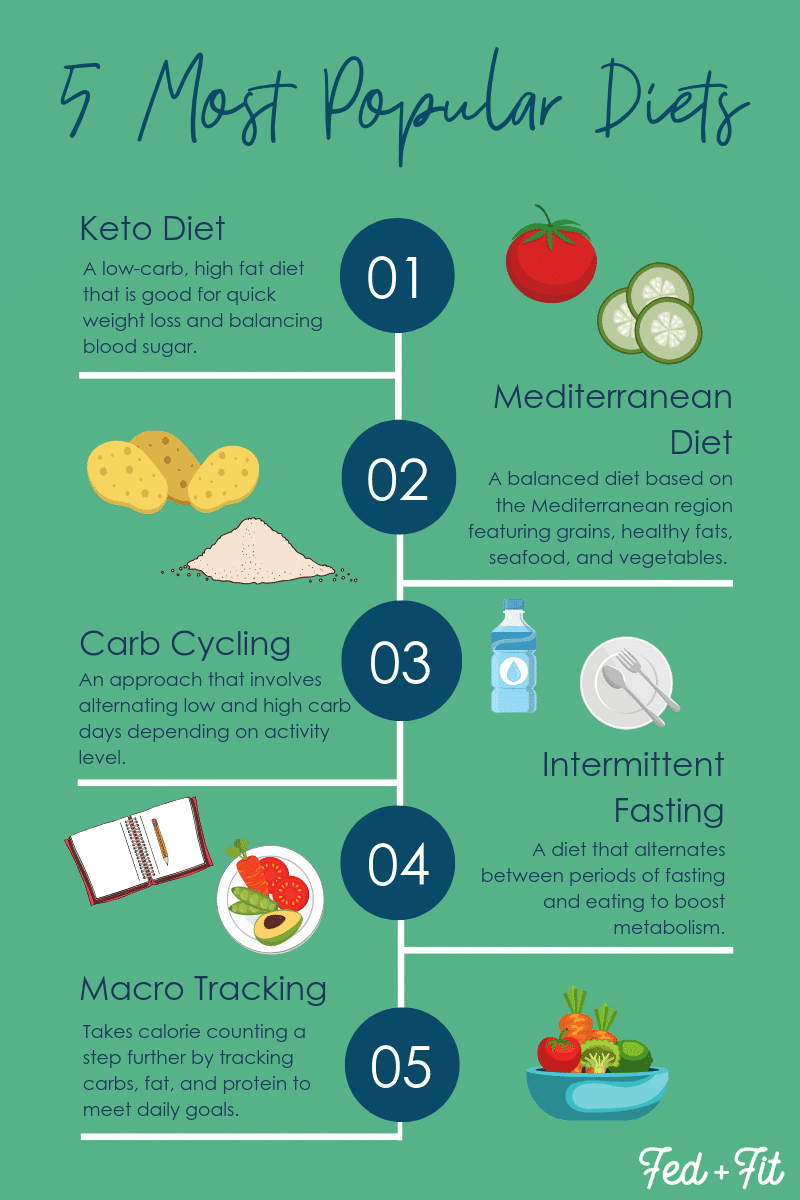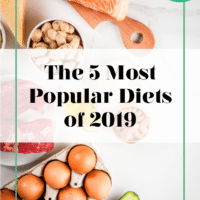Today we’re digging into the 5 most popular diets of 2019! We’ll share the basics of each diet, tell you who should give it a try, who shouldn’t, and what our overall opinion is. Let’s dive in!
This article was written by Courtney Moore, MS RDN LD. Courtney is a registered dietitian nutritionist living in Dallas, TX with her husband and baby girl. She studied Human Nutrition, Food Science and Hospitality with a concentration in dietetics at the University of Arkansas (woo pig!) and completed her dietetic internship as well as her Master’s of Science in Nutrition and Dietetics at the University of Kansas Medical Center. She has worked in many different areas of nutrition, spending most of her years as a transplant nutrition specialist but found that her heart is in preventive medicine and wellness! As a subject matter expert, Courtney regularly contributes articles about all things food and nutrition. Take it away, Courtney!
New diets and “rhythms” of eating are always coming and going. Whether it be a trend or a new method or idea, the recommendations or new ways in which we think about or actually fuel our bodies seem to be ever-changing. That is part of the beauty of nutrition—the science and ideas are always evolving. But, it can also be frustrating and confusing, as there seems to always be a new “best way” to eat.
Today, we are going to break down 5 of the most popular current diet trends. We’ll give a brief overview, tell you who may or may not be best for that specific style of eating and give our overall opinion.
The Ketogenic Diet (“Keto”)
What is the Keto Diet?
The ketogenic diet has definitely been one of the top most popular diets of 2019. It is a very low carbohydrate, high fat, moderate protein diet. The very low carb intake that the diet requires (typically less than 20-30g of carbohydrates/day) causes your body to go into a state of ketosis. Ketosis occurs when your body doesn’t have enough glucose (its preferred energy source) to burn for fuel, so instead, it starts to grab stored fat and use that for energy instead. This process results in a high level of ketones in the body. Typically, keto diets require carbohydrates to be somewhere between 5-10% of total calories/day, protein to be 20-35% of total calories/day and fat to be 65-75% of total calories/day.
Who is the keto diet best for? Who should avoid it?
A ketogenic diet is not a new discovery. It has been used in the treatment of epilepsy for years, and research is ongoing regarding the ketogenic diet and its role in other brain disorders (2).
A few of the benefits of the diet are that it often causes quick weight loss and improves blood sugar levels and insulin sensitivity. Changes in cholesterol have also been seen while on the ketogenic diet – though some studies report a negative effect with increased LDL and lowered HDL; while other studies have seen a positive correlation with a decreased LDL and increased HDL (2,3).
If you are wanting to lose weight quickly and/or have type 2 diabetes and/or insulin resistance, you may want to try this diet for a short period of time. If you are an athlete, are trying to get pregnant, are pregnant or breastfeeding, we wouldn’t recommend you try the keto diet as carbohydrate intake is often vital for your body in those states.
Our Opinion on the Keto Diet
While the science is still unclear, the keto diet can be appropriate for some people in the short term. We would not recommend following this way of eating for months and months. This is for a couple of reasons:
- This way of eating is very difficult to stick to and can be isolating. If you stick to it and then break and stick to it and then break, this can cause the “yo-yo” dieting effect, which is something we want to avoid in the long run.
- This diet cuts out many, many foods and with that, micronutrients are lost and you can end up depleted.
- Lastly, our goal is for you to eat as many foods as you can and while feeling your very best. That includes being able to enjoy birthdays, celebrations, etc. and often on this diet, people can feel isolated or deprived because of the tight restrictions.
The Mediterranean Diet
What is the Mediterranean Diet?
The Mediterranean Diet has been around for years and years and continues to be one of the most popular and most recommended diets of all time and was named “the best diet for 2019” according to CNN health (4). The Mediterranean diet comes from the way of eating seen in many countries near or surrounding the Mediterranean Sea. It focuses on whole grains, vegetables, fruit, olive oil as the primary source of fat, nuts, beans, seeds, eggs, fish, cheese/yogurt in moderate amounts with meats eaten in small portions and very low sugar. Moderation and balance are 2 keys to this diet. As you can see with the vast variety of foods and no prescription of macronutrient allotment or time constraints, this diet provides a lot of freedom.
Who is the Mediterranean diet best for? Who should avoid it?
There is no group of people that this diet or way of eating is off-limits for. Most everyone can adopt this way of eating and see benefits, and it can be easily adapted to many sensitivities. This diet has also shown to lower the risk of certain cancers and be very beneficial for multiple health conditions and diseases, including heart disease, high blood pressure, diabetes, and rheumatoid arthritis (6,7).
Our Opinion on the Mediterranean Diet
We love this lifestyle and way of eating, it’s no wonder why it is one of the most popular diets! While the medical benefits are huge, the application of following this style of eating and living is absolutely doable while still being able to enjoy dining out with friends and family, be present at celebrations, and the whole family can eat alongside with you in this – this doesn’t require multiple meals for different people within one family. It is very low in restriction and encourages variety in both macro and micronutrients allowing people to be fully nourished.
Carb Cycling
What is Carb Cycling?
Carb cycling is one of the top most popular diets of 2019. It is exactly as it sounds- the diet involves changing (or cycling) your carbohydrate intake either from day-to-day, week-to-week or another set period of time. People use this way of eating for many reasons which include: hitting different body composition goals, helping overcome a weight loss plateau, athletic training or for more of a natural rhythm based on their training days vs. non-training days. While protein intake continues to be about the same each day, fat intake is what will vary based on the carbohydrate intake. The idea makes sense but is actually somewhat new, and there is pretty limited research in this area.
Who is Carb Cycling best for? Who Should avoid it?
Carb cycling is likely best for the high-level athlete: marathon runners, triathletes, and others doing intense exercise or training done multiple days throughout a week/month. The idea here is to help the body utilize carbohydrates as fuel and help fight fatigue as well as aid in recovery on days of most intense training. For the average athlete or one who exercises at leisure, this can be helpful, but may be more work than necessary as the amount of carbohydrate used and required for replenishment may not be enough to make big changes day to day within the week.
Our Opinion on Carb Cycling
While carb cycling is somewhat new to the scene, we think it does make sense for the right candidate. However, more research is needed to know the true benefits. If you are an intense athlete, this may be a great option for you. If you are not, you still could absolutely try this, but we don’t think that this may be the best use of your time and energy. The amount of planning/variation from day to day and different levels of carb may be pretty time consuming and ultimately, likely not make that huge of a difference in weight or performance for the average athlete.
Macro Tracking
What is macro tracking?
“IIFIYM” … “If It Fits in Your Macros” – you may have seen this around or heard people using this phrase. Macro counting has been growing in following and is definitely one of the most popular diets of the year. It is somewhat similar to calorie counting but goes deeper into the details. Basically, you track your calories, carbohydrates, fat, and protein each day, trying to meet a specific number for each. The total amount of each macronutrient varies depending on your goals, gender, weight, height, etc. You will have to track, count and log everything you eat each day – which can be pretty labor-intensive!
Who is macro tracking best for? Who should avoid it?
This method can work well for many people. It can help with weight loss and also help you hit different wellness goals, such as building muscle. However, if you have struggled or do struggle with disordered eating, it may not be wise to pursue this way of eating as counting and tracking is very involved and can be all-consuming. Since macro counting varies so much and is so specific from person to person, this method can be used in many different seasons or stages of life!
Our Opinion on Tracking Macros
Counting macros can be used as a tool for accountability and checking in and helping find balance. We love that it emphasizes balancing the macronutrients rather than just a total lump sum of total calories allotted for each day. However, the way we eat is not intended to become only about the numbers. It is very easy to get caught up in the counting and obsessing over numbers/goals and lose sight of the initial goal – which is fueling your body well. Counting macros does not consider everything that is going on within your body, such as inflammation, hormonal imbalance, immune responses, etc. and many times you can still fit an unhealthy diet into your macro plan. So, although counting macros can be a great guideline, it still doesn’t give you a great starting point in terms of what you should be eating.
Intermittent Fasting (IF)
What is intermittent fasting?
Intermittent fasting is undoubtedly one of the most popular diets of 2019. It isn’t exactly a diet, but rather a rhythm of eating that includes long periods of fasting. There are many different types of IF based on how the fasting and eating periods alternate. Two of the most common types include the 5:2 – which has you eat 5 days of the week and then 500 kcals/day the other 2 days of the week (not quite a fast, but very low calorie) and time-restrictive, where you fast for a certain amount of time each day. 16 hours fasting and 8 hours eating is a common time gap. Studies have shown that fasting can be beneficial for weight loss, improving insulin sensitivity, and heart health. Because the restriction is more on the times of when to eat and when to fast, you don’t have to make huge changes to your diet immediately—many people like this aspect and find it easy to follow.
Who is intermittent fasting best for? Who should avoid it?
IF is not for everyone – and again, needs to be assessed by the individual. Men may benefit more from IF than women. While studies are still looking into the exact mechanisms, women may be more sensitive to intermittent fasting and not have the same benefits, or even see a negative hormonal response while trying IF (13). If you have struggled with disordered eating- we would not recommend IF. Also, if you are pregnant and/or breastfeeding, intermittent fasting would not be wise.
Our Opinion on Intermittent Fasting
Intermittent fasting can be a great tool for weight loss as well as potentially have many health benefits, however, it may vary person to person. IF may be easier when it comes to food, but it can be hard to enjoy meals or celebrations with friends and families if the times of the celebrations fall outside of the “eating” window. If the goal is to be able to live life well, feel your best and enjoy all the things – this rhythm of eating may be tricky. However, we are big believers in letting your body rest from eating overnight and between meals – many benefits can be seen when we let our bodies fully rest and digest our foods. If you do decide to try intermittent fasting, we would recommend paying close attention to your body and adjusting as needed.
So which of the most popular diets of 2019 is the best diet?
We think that all of these most popular diets can be great tools. Our goal for you would be that you are able to eat the largest amount of foods, feel your very best, and not feel like you have to live in a “dieting” mindset. For this, we recommend really digging in and finding out what foods work best for you so that you don’t have to diet. However, if you are looking to improve your health and don’t know where to start, or you feel like you’ve really found the foods that work best for you but want to experiment with different methods of eating to see how they impact metabolism, energy, etc. these diets can be a great place to start. If you do choose to start a diet, we recommend keeping a journal where you can track your food, exercise, water intake, mood, and wellness so that you can see the full picture of how the diet is affecting your body.
Through journaling, you can really learn how to listen to and trust your body – you’ll discover what makes it feel and function at its best and listen to that. Eventually, you’ll arrive at a custom plan that focuses on YOU and YOUR body – instead of what works for someone else. As we’ve said many times, what is best for each person is so different and so individual! Learning how to fuel your body best is a journey and know that there is no one magic way or one right way to do it. Continue to lean in and learn. Take notes and be patient as you learn about you and what is best for you. If you are still trying to figure out what foods work best for you, we recommend going through the Fed and Fit Project that is laid out in the Fed and Fit book.
There you have it, our guide to the 5 most popular diets of 2019! We hope that this overview helps make navigating the world of dieting easier for you.
References
- Mawer, Rudy. “The Ketogenic Diet: A Detailed Beginner’s Guide to Keto.” Healthline, Healthline Media, 30 July 2018, www.healthline.com/nutrition/ketogenic-diet-101#takeaway.
- Campos, Marcelo. “Ketogenic Diet: Is the Ultimate Low-Carb Diet Good for You?” Harvard Health Blog, 30 July 2019, www.health.harvard.edu/blog/ketogenic-diet-is-the-ultimate-low-carb-diet-good-for-you-2017072712089
- Dennett, Carrie. “The Ketogenic Diet for Weight Loss – Today’s Dietitian Magazine.” Today’s Dietitian, Jan. 2019, www.todaysdietitian.com/newarchives/0119p26.shtml.
- LaMotte, Sandee. “Mediterranean Diet Named the Best for 2019.” CNN, Cable News Network, 2 Jan. 2019, www.cnn.com/2019/01/02/health/mediterranean-best-diet-2019/index.html.
- Gunnars, Kris. “Mediterranean Diet 101: A Meal Plan and Beginner’s Guide.” Healthline, Healthline Media, 24 July 2018, www.healthline.com/nutrition/mediterranean-diet-meal-plan.
- Palmer, Sharon. “The Mediterranean Diet – A Practical Guide to Shopping, Menu Ideas, and Recipes.” Today’s Dietitian, 2012, www.todaysdietitian.com/newarchives/050112p30.shtml.
- “Diet Review: Mediterranean Diet.” The Nutrition Source, 22 May 2019, www.hsph.harvard.edu/nutritionsource/healthy-weight/diet-reviews/mediterranean-diet/.
- Mawer, Rudy. “What Is Carb Cycling and How Does It Work?” Healthline, Healthline Media, 12 June 2017, www.healthline.com/nutrition/carb-cycling-101.
- Team, Family Health. “What to Eat If You’re Carb Cycling.” Health Essentials from Cleveland Clinic, Health Essentials from Cleveland Clinic, 13 Aug. 2019, health.clevelandclinic.org/what-to-eat-if-youre-carb-cycling/.
- Tello, Monique. “Intermittent Fasting: Surprising Update.” Harvard Health Blog, 26 June 2018, www.health.harvard.edu/blog/intermittent-fasting-surprising-update-2018062914156.
- Gunnars, Kris. “Intermittent Fasting 101 – The Ultimate Beginner’s Guide.” Healthline, Healthline Media, 25 July 2018, www.healthline.com/nutrition/intermittent-fasting-guide.
- Kollias, Helen. “Intermittent Fasting for Women: Important Information You Need to Know.” Precision Nutrition, 7 Aug. 2019, www.precisionnutrition.com/intermittent-fasting-women.















